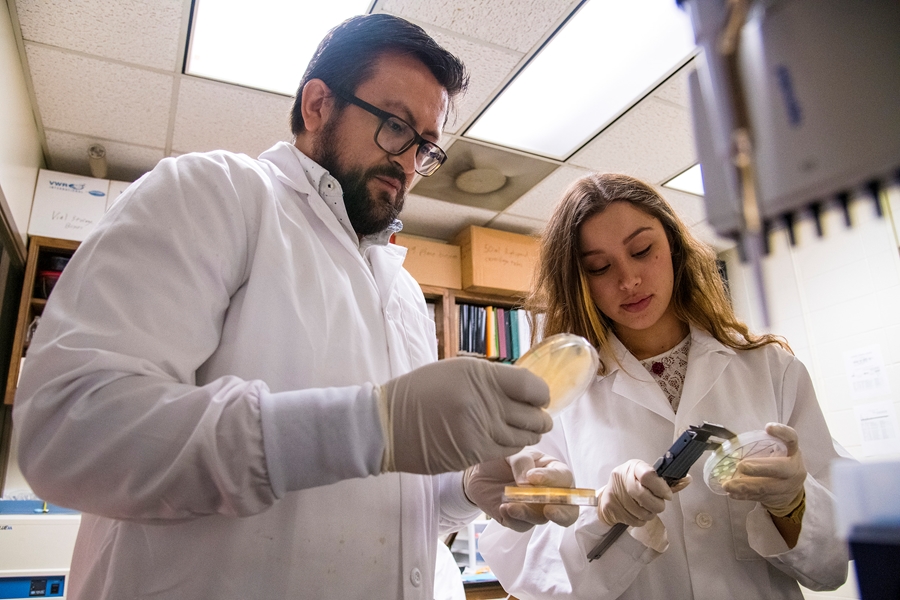
FAYETTEVILLE, Ark. – Alejandro Rojas, assistant professor of soilborne pathology and ecology at the University of Arkansas, with the help of a student intern, conducted studies this summer to see if specific bacteria can be used to fight certain plant diseases, and how those methods can potentially be transferred to help manage crops in the field.
Specifically, Rojas, a member of the faculty in the Dale Bumpers College of Agricultural, Food and Life Science's Department of Entomology and Plant Pathology and scientist with the U of A System Division of Agriculture, is determining if bacteria can combat seedling diseases and root rot, which lead to reduced plant stand and lower performance in the field.
Laura Delgado, a fourth-year student in biology and microbiology at Los Andes University in Bogota, Colombia, assisted Rojas with the "Survey of Seedling and Root Disease in Field and Horticultural Crops in Arkansas" project.
Delgado participated as a Bollenbacher Scholar, which funds undergraduate student summer internships. She was in Fayetteville from the end of May and completed her research efforts this month.
The Department of Entomology and Plant Pathology offers the undergraduate endowed scholarship in honor of Katharina Bollenbacher, a U of A alumna and USDA scientist who worked on the Fayetteville campus.
Delgado conducted preliminary testing of two bacterial species, Pseudomonas flourescens and Burkholderia cenocepacia, as potential biocontrol agents against fungi and water molds (oomycetes) causing diseases on field crops in Arkansas.
"One of the most important benefits of the Bollenbacher internship is that we engage students in research in agriculture, exposing them to graduate-level research," said Rojas. "As important, we also expose them to the challenges we are currently addressing, helping growers enhance crop yields with the pressure imposed by changing weather patterns and increasing population, in a sustainable manner. We hope that students get an understanding of the impact and importance of research in agriculture in ever-changing environmental and social conditions."
Delgado developed methods to determine if biocontrol mechanisms against fungi and water molds overlap with the control of bacterial panicle blight, a disease which has impacted rice crops, and how they may be used in greenhouse and field testing.
Bollenbacher was a member of the U of A Class of 1934 and earned a master's degree in 1936. She was a member of the USDA research staff from 1936 until retiring in 1971. The USDA assigned her to the U of A in 1955 as a cooperating agent with the Agricultural Experiment Station. Her scientific contributions in investigation of diseases of cotton and in weed control contributed to the science of agriculture and were of importance to cotton consumers and producers, as well as other scientists.
Agricultural professionals she worked with, friends and members of her family contributed funds for the endowed scholarship.
The research internship is offered every year to undergraduates, at the U of A or other institutions, with an interest in plant pathology. The application is available here.
About the Dale Bumpers College of Agricultural, Food and Life Sciences: Bumpers College provides life-changing opportunities to position and prepare graduates who will be leaders in the businesses associated with foods, family, the environment, agriculture, sustainability and human quality of life; and who will be first-choice candidates of employers looking for leaders, innovators, policy makers and entrepreneurs. The college is named for Dale Bumpers, former Arkansas governor and longtime U.S. senator who made the state prominent in national and international agriculture. For more information about Bumpers College, visit our website, and follow us on Twitter at @BumpersCollege and Instagram at BumpersCollege.
About the University of Arkansas: The University of Arkansas provides an internationally competitive education for undergraduate and graduate students in more than 200 academic programs. The university contributes new knowledge, economic development, basic and applied research, and creative activity while also providing service to academic and professional disciplines. The Carnegie Foundation classifies the University of Arkansas among only 2.7 percent of universities in America that have the highest level of research activity. U.S. News & World Report ranks the University of Arkansas among its top American public research universities. Founded in 1871, the University of Arkansas comprises 10 colleges and schools and maintains a low student-to-faculty ratio that promotes personal attention and close mentoring.
Topics
Contacts
Robby Edwards, director of communications
Dale Bumpers College of Agricultural, Food and Life Sciences
479-575-4625,